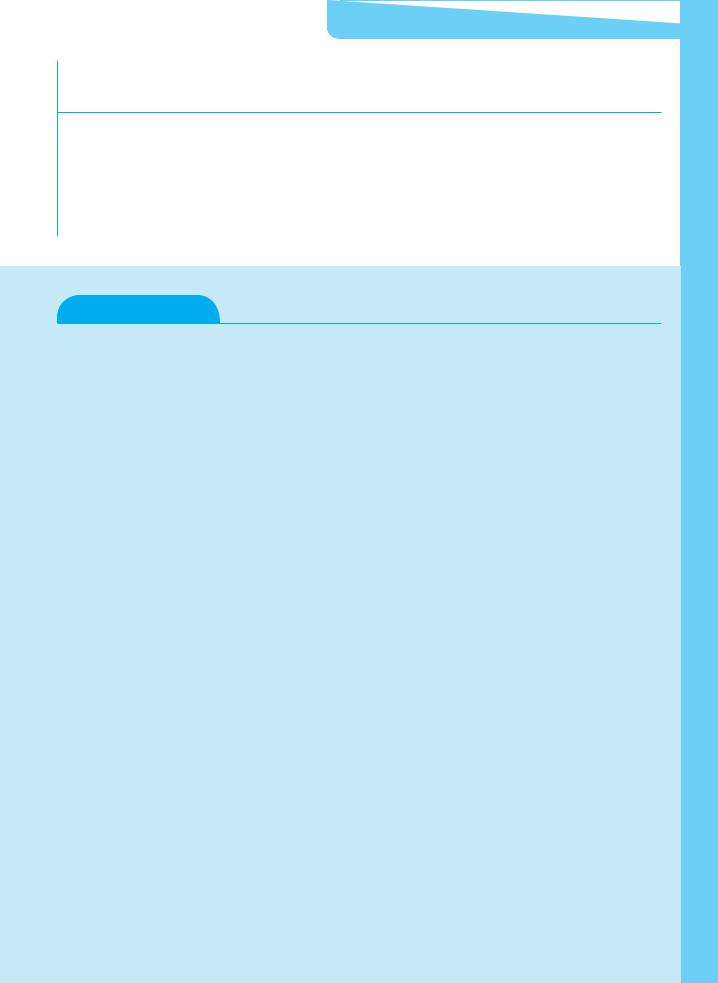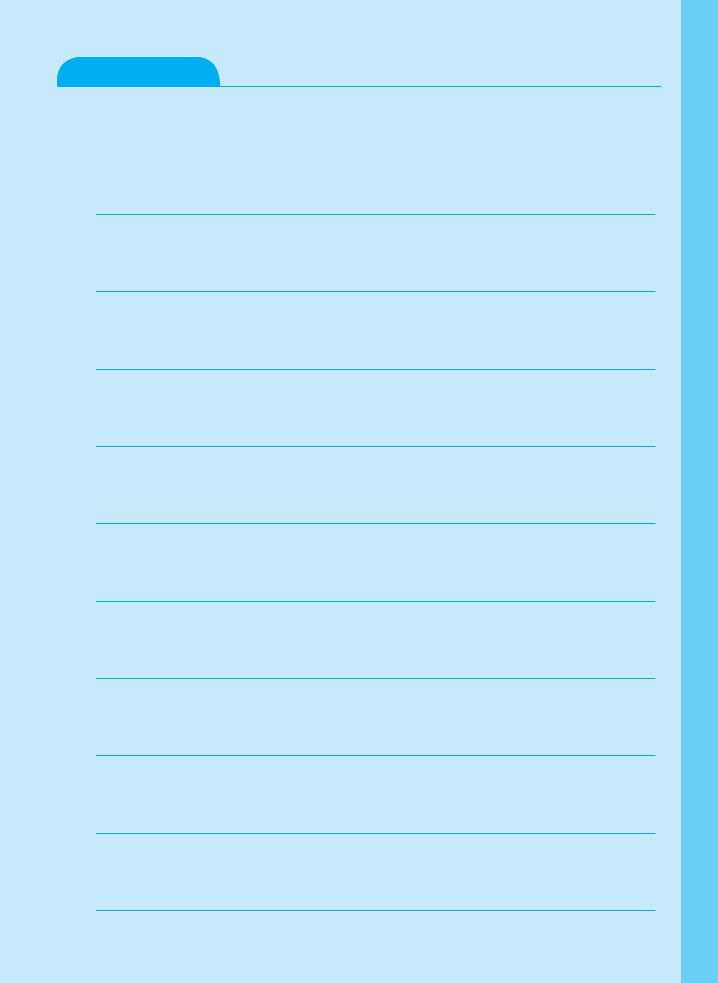
- •Note to the Student from the Publisher
- •1 Nouns
- •2 Pronouns
- •3 Adjectives
- •4 Determiners
- •5 Verbs and Tenses
- •6 Auxiliary Verbs
- •7 Adverbs and Adverb Phrases
- •8 Prepositions and Prepositional Phrases
- •9 Conjunctions
- •10 Sentences
- •11 Direct and Indirect Speech
- •12 Punctuation
- •A List of Irregular Verbs

11 Direct and Indirect Speech
Direct Speech
The exact words that someone says are called direct speech. Quotation marks “ ” are used to set off direct speech.
Mom said, “Where are my keys?” “This ice cream is delicious,” said Tom.
“Have you boys washed your hands?” asked Dad. “Please get out of the car,” the police officer ordered. “What a beautiful dress!” said Sally.
Indirect Speech
You can report what someone says without using their exact words. To do this, use a verb like say, ask or tell, followed by that. This is called indirect speech. There are several differences between a sentence with direct speech and a sentence with indirect speech.
nYou don’t use quotation marks with indirect speech.
nYou change the tense of the verb.
nYou change the pronouns and determiners.
Here are some examples. The verb tenses that change are printed in bold and the pronouns and determiners that change are printed in color. Remember that the past tense of can is could and the past tense of will is would.
direct speech |
indirect speech |
Maggie said, “I feel ill.” |
Maggie said that she felt ill. |
Sumiko said, “It’s time to leave.” |
Sumiko said that it was time to leave. |
“I can’t find my book,” said Alice. |
Alice said that she couldn’t find her book. |
“John is hitting me,” said Peter. |
Peter said that John was hitting him. |
Dad said, “I haven’t had my |
Dad said that he hadn’t had his |
breakfast yet.” |
breakfast yet. |
“My car won’t start,” said Mom. |
Mom said that her car wouldn’t start. |
134

Direct and Indirect Speech: Indirect Commands
In indirect speech people often leave out the conjunction that.
Maggie said that she felt ill.
Sumiko said that it was time to leave. Alice said that she couldn’t find her book. Peter said that John was hitting him.
Dad said that he hadn’t had his breakfast yet.
When you are using indirect speech to report a statement that is still true now, you don’t change the tense of the verb.
direct speech |
indirect speech |
John said, “My mom doesn’t like |
John said that his mom doesn’t like |
fish.” |
fish. |
“I live in a house by the sea,” said |
Anna said that she lives in a house |
Anna. |
by the sea. |
Dad said, “Paris is a beautiful city.” |
Dad said Paris is a beautiful city. |
Indirect Commands
Use verbs like order, tell and warn to report orders and instructions. The construction to + verb or not to + verb may also be used.
direct speech |
indirect speech |
|
|
The teacher said, “Stop running in the corridor!”
“Put your books away, children,” said Mr. Park.
Dad said to David, “Please help me by washing the dishes.”
Jack said to Maggie, “Please don’t tell anyone my secret!”
Miss Lee said to Alan, “Don’t be late again tomorrow.”
The teacher ordered us to stop running in the corridor.
Mr. Park told the children to put their books away.
Dad asked David to help him by washing the dishes.
Jack begged Maggie not to tell anyone his secret.
Miss Lee warned Alan not to be late again the next day.
135

Direct and Indirect Speech: Indirect Questions
|
Indirect Questions |
|
|
|
|
The verb ask is usually used to report questions. |
|
|
|||
|
|
|
|
|
|
direct speech |
indirect speech |
|
|
|
|
|
|
Sally said, “Where is my backpack?” |
Sally asked where her backpack was. |
|
|
Peter said, “Have you finished your |
Peter asked if I had finished my |
|
|
homework?” |
homework. |
|
|
|
|
To report a question, put the subject before the verb or helping verb. Remember that the subject comes after the helping verb when you ask a question. Here are some examples. The subjects are printed in bold and the verbs are printed in color.
asking a question |
reporting a question |
“Where are they going?” |
I asked where they were going. |
“Can Jack ride his bike?” |
I asked if Jack could ride his bike. |
“Did Miss Lee sing a song?” |
I asked whether Miss Lee sang a song. |
“Has she finished her homework?” |
I asked if she had finished her |
|
homework. |
To report a question-word question, use the same question word in direct speech.
direct speech |
indirect speech |
Mom said, “Where are your shoes?” |
Mom asked where my shoes were. |
Maggie said, “Who has taken my |
Maggie asked who had taken her pen. |
pen?” |
|
“What time does the show start?” |
Sue asked what time the show started. |
asked Sue. |
|
Peter said, “Why did you leave |
Peter asked why I left before the end of |
before the end of the movie?” |
the movie. |
136

Direct and Indirect Speech: Indirect Commands
Whenverb. you are reporting yes or no questions, use if or whether after the
direct speech |
indirect speech |
“Is it raining?” asked Tom. |
Tom asked if it was raining. |
Alice said, “Can you help us?” |
Alice asked whether I could help them. |
Dad said, “Is the train on time?” |
Dad asked if the train was on time. |
Exercise 1
Fill in the blank spaces with a verb in the correct tense. The first one has been done for you.
|
direct speech |
indirect speech |
|
|
|
|
|
|
|
|
|
|
|
|
|
|
||
1. |
“I am very tired,” said Dad. |
Dad said that he |
|
|
was |
|
very tired. |
|||||||||||
2. |
“You look very handsome, Mike,” |
Mom told Mike that he |
|
|
|
|
|
|
|
|
|
|
|
|
|
|
||
|
said Mom. |
very handsome. |
|
|
|
|
|
|
|
|
|
|
|
|
|
|
||
3. |
The teacher said, “Sam has not |
The teacher said that Sam |
|
|
|
|
|
|
|
|
|
|
||||||
|
made any mistakes.” |
not made any mistakes. |
|
|
|
|
|
|
|
|||||||||
4. |
“I am losing my patience,” said |
Mr. Carter said that he |
|
|
|
|
|
|
|
|
|
|
|
|
losing |
|||
|
Mr. Carter. |
his patience. |
|
|
|
|
|
|
|
|
|
|
|
|
|
|
||
5. |
“You can come to my house for |
Maggie told Jason that he |
|
|
|
|
|
|
|
|
|
|||||||
|
dinner,” Maggie told Jason. |
come to her house for dinner. |
|
|
|
|
|
|
|
|||||||||
6. |
Dad said, “Hurry up or we will be |
Dad told us to hurry up or we |
|
|
|
|
|
|
|
|
||||||||
|
late.” |
be late. |
|
|
|
|
|
|
|
|
|
|
|
|
|
|
||
7. |
“The train is coming,” said Peter. |
Peter said that the train |
|
|
|
|
|
|
|
|
||||||||
|
|
coming. |
|
|
|
|
|
|
|
|
|
|
|
|
|
|
||
8. |
“I have cleaned up my room,” said |
Kathleen said that she |
|
|
|
|
|
|
|
|
|
cleaned |
||||||
|
Kathleen. |
up her room. |
|
|
|
|
|
|
|
|
|
|
|
|
|
|
||
9. |
The teacher said, “It is time to stop |
The teacher said that it |
|
|
|
|
|
|
time |
|||||||||
|
writing.” |
to stop writing. |
|
|
|
|
|
|
|
|
|
|
|
|
|
|
||
10. |
“I don’t want to watch TV,” said |
John said that he |
|
|
|
|
|
|
|
|
|
want to |
||||||
|
John. |
watch TV. |
|
|
|
|
|
|
|
|
|
|
|
|
|
|
||
137

Exercise 2
Complete these indirect speech sentences with the correct pronoun or determiner. The first one has been done for you.
|
direct speech |
indirect Speech |
|
|
|
|
|
|
|
|
|
|
|
||||||
1. |
“My head is aching,” said Sarah. |
Sarah said that |
|
|
her |
|
head was |
||||||||||||
|
|
aching. |
|
|
|
|
|
|
|
|
|
|
|
||||||
2. |
“I like your new bike,’ Dan told |
Dan told me that he liked |
|
|
|
|
|
|
|
|
|
||||||||
|
|
|
|
|
|
|
|
|
|||||||||||
|
me. |
new bike. |
|
|
|
|
|
|
|
|
|
|
|
||||||
3. |
Tom and Peter said, “We’ll give you |
Tom and Peter said that they would give us |
|||||||||||||||||
|
our seats.” |
|
|
|
|
|
seats. |
|
|
|
|
|
|
|
|||||
4. |
“You can borrow my book,” Michael |
Michael said that I could borrow |
|
|
|
|
|||||||||||||
|
said. |
book. |
|
|
|
|
|
|
|
|
|
|
|
||||||
5. |
“I haven’t brushed my teeth,” said |
Paul said that he hadn’t brushed |
|||||||||||||||||
|
Paul. |
|
|
|
|
teeth. |
|
|
|
|
|
|
|
|
|
|
|
||
6. |
“You are late again,” Mr. Chen told |
Mr. Chen said that |
|
|
|
|
|
|
|
|
was late |
||||||||
|
me. |
again. |
|
|
|
|
|
|
|
|
|
|
|
||||||
7. |
“We have finished our homework,” |
The boys said that they had finished |
|||||||||||||||||
|
said the boys. |
|
|
|
|
homework. |
|
|
|
|
|
|
|
||||||
8. |
Sue and Maggie said, “We want |
Sue and Maggie said that |
|
|
|
|
|
|
|
|
|||||||||
|
to watch football on TV.” |
wanted to watch football on TV. |
|||||||||||||||||
9. |
“I don’t like your green hair,” said |
Uncle David said that |
|
|
|
|
|
didn’t |
|||||||||||
|
Uncle David. |
like my green hair. |
|
|
|
|
|
|
|
|
|
|
|
||||||
10. |
Dad said, “We’ll have to phone for a |
Dad said that |
|
|
|
|
|
would have to |
|||||||||||
|
taxi.” |
phone for a taxi. |
|
|
|
|
|
|
|
|
|
|
|
||||||
138

Exercise 3
Rewrite the following sentences as indirect questions or indirect commands. The first one has been done for you.
1.“Are you feeling ill?” Mom asked.
Mom asked if I was feeling ill.
2.“When will you finish the work?” Dad asked the plumber.
3.The teacher said, “Open your books, children.”
4.“Turn the music down, Maggie,” said Mom.
5.“Please take your shoes off at the door, Tom,” said Uncle David.
6.“Have you read the Harry Potter books?” Michael asked.
7.Jenny said, “Would you like some more orange juice, Peter?”
8.“Don’t be rude to your teacher, children,” said the principal.
9.“Write your name at the top of the page, everyone,” said Miss Lee.
10.“Does the ball belong to you boys?” the woman asked.
139
